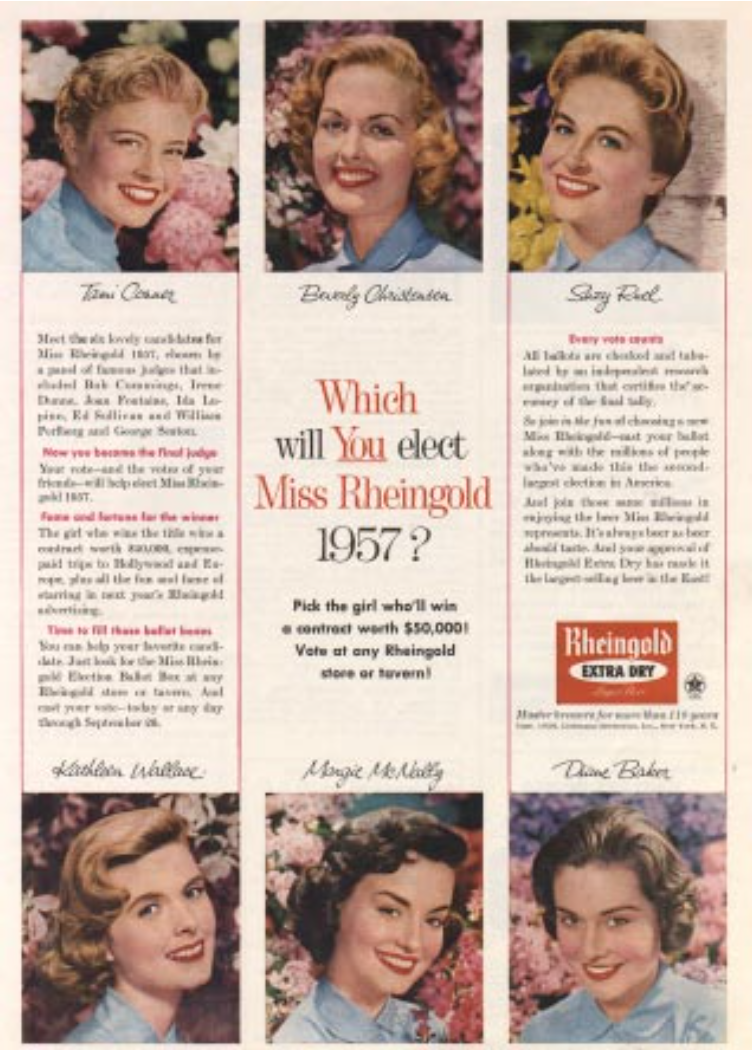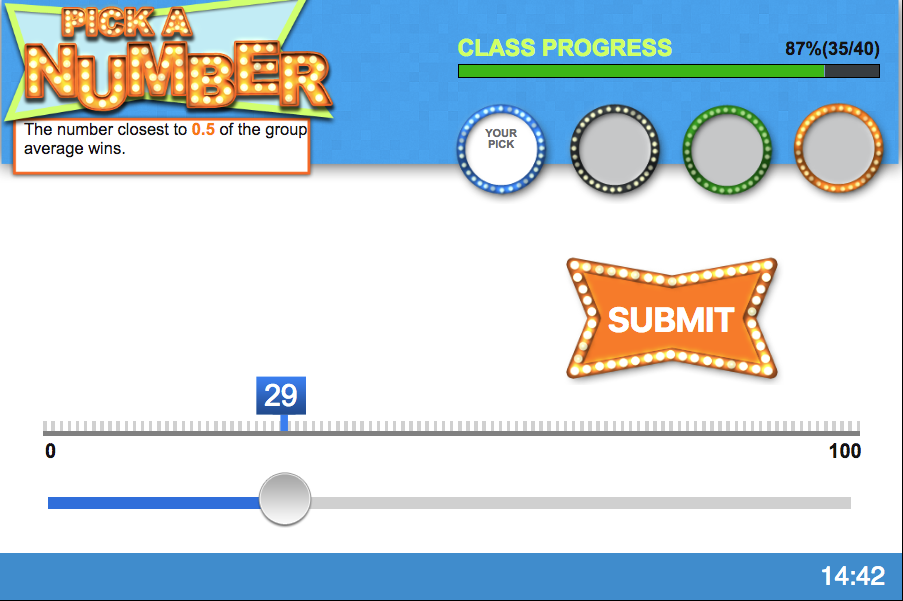In The General Theory of Employment, Interest, and Money, John Maynard Keynes wrote about an instability in markets that emerged from a “spontaneous urge to action.” The idea was that traders did not calculate the expected value of an asset but operated on another premise, something so nebulous that it was dubbed “animal spirits.”One example that Keynes employed to demonstrate how the mass psychology of financial markets works was a newspaper game. Readers selected six women's photographs from one hundred as being the most lovely. But, the prize was awarded to the reader whose choices corresponded to the choices of everyone else. Thus, it was not as simple as who YOU thought was beautiful, but who OTHERS thought was beautiful (as well as what they were thinking about you). One game used to formalize this newspaper game is the "Beauty Contest" presented in Rosemarie Nagel's 1995 AER article.Suppose you're in a group of 100 people. Everyone is asked to guess a number from 0 and 100. The guess that is closest to 1/2 of the average guess wins. What do you choose?
One game used to formalize this newspaper game is the "Beauty Contest" presented in Rosemarie Nagel's 1995 AER article.Suppose you're in a group of 100 people. Everyone is asked to guess a number from 0 and 100. The guess that is closest to 1/2 of the average guess wins. What do you choose? Game theorists assume rationality. I am rational. You are rational. I know you know I am rational. And so forth. Here's out it plays out. If everyone guesses 100 the answer could at most be 50. But, if everyone knows numbers above 50 are dominated then the choice set is from 0 to 50. At that point any number greater than 25 is weakly dominated. But, now the choice set is 0 to 25 ... Keep riding that train all the way to zero. That's the Nash Equilibrium. But, most economists would not choose zero in part because we know others don't think this way about the problem. Evidence of this can be found in a Richard Thaler FT article on the guessing game (there are some real gems toward the bottom).What concepts can the Keynesian Beauty Contest help illuminate? For game theory it is a great example of a dominance solvable game. But, it opens up more conversations. The unique equilibrium where all guesses equal zero occurs “in the limit” (e.g. suppose all guesses equal 1 you would want to deviate to .5 but if everyone does that then .25, .125, .0625, etc. without ever reaching zero). Most people are real humans and not economists and therefore make decisions with a limited number of steps of iterated dominance. This can be a great way to open up conversations about bounded rationality. Of course, the game can also be used to talk about players who take advantage of lower level reasoning, which I will discuss in an upcoming post.
Game theorists assume rationality. I am rational. You are rational. I know you know I am rational. And so forth. Here's out it plays out. If everyone guesses 100 the answer could at most be 50. But, if everyone knows numbers above 50 are dominated then the choice set is from 0 to 50. At that point any number greater than 25 is weakly dominated. But, now the choice set is 0 to 25 ... Keep riding that train all the way to zero. That's the Nash Equilibrium. But, most economists would not choose zero in part because we know others don't think this way about the problem. Evidence of this can be found in a Richard Thaler FT article on the guessing game (there are some real gems toward the bottom).What concepts can the Keynesian Beauty Contest help illuminate? For game theory it is a great example of a dominance solvable game. But, it opens up more conversations. The unique equilibrium where all guesses equal zero occurs “in the limit” (e.g. suppose all guesses equal 1 you would want to deviate to .5 but if everyone does that then .25, .125, .0625, etc. without ever reaching zero). Most people are real humans and not economists and therefore make decisions with a limited number of steps of iterated dominance. This can be a great way to open up conversations about bounded rationality. Of course, the game can also be used to talk about players who take advantage of lower level reasoning, which I will discuss in an upcoming post.
 One game used to formalize this newspaper game is the "Beauty Contest" presented in Rosemarie Nagel's 1995 AER article.Suppose you're in a group of 100 people. Everyone is asked to guess a number from 0 and 100. The guess that is closest to 1/2 of the average guess wins. What do you choose?
One game used to formalize this newspaper game is the "Beauty Contest" presented in Rosemarie Nagel's 1995 AER article.Suppose you're in a group of 100 people. Everyone is asked to guess a number from 0 and 100. The guess that is closest to 1/2 of the average guess wins. What do you choose? Game theorists assume rationality. I am rational. You are rational. I know you know I am rational. And so forth. Here's out it plays out. If everyone guesses 100 the answer could at most be 50. But, if everyone knows numbers above 50 are dominated then the choice set is from 0 to 50. At that point any number greater than 25 is weakly dominated. But, now the choice set is 0 to 25 ... Keep riding that train all the way to zero. That's the Nash Equilibrium. But, most economists would not choose zero in part because we know others don't think this way about the problem. Evidence of this can be found in a Richard Thaler FT article on the guessing game (there are some real gems toward the bottom).What concepts can the Keynesian Beauty Contest help illuminate? For game theory it is a great example of a dominance solvable game. But, it opens up more conversations. The unique equilibrium where all guesses equal zero occurs “in the limit” (e.g. suppose all guesses equal 1 you would want to deviate to .5 but if everyone does that then .25, .125, .0625, etc. without ever reaching zero). Most people are real humans and not economists and therefore make decisions with a limited number of steps of iterated dominance. This can be a great way to open up conversations about bounded rationality. Of course, the game can also be used to talk about players who take advantage of lower level reasoning, which I will discuss in an upcoming post.
Game theorists assume rationality. I am rational. You are rational. I know you know I am rational. And so forth. Here's out it plays out. If everyone guesses 100 the answer could at most be 50. But, if everyone knows numbers above 50 are dominated then the choice set is from 0 to 50. At that point any number greater than 25 is weakly dominated. But, now the choice set is 0 to 25 ... Keep riding that train all the way to zero. That's the Nash Equilibrium. But, most economists would not choose zero in part because we know others don't think this way about the problem. Evidence of this can be found in a Richard Thaler FT article on the guessing game (there are some real gems toward the bottom).What concepts can the Keynesian Beauty Contest help illuminate? For game theory it is a great example of a dominance solvable game. But, it opens up more conversations. The unique equilibrium where all guesses equal zero occurs “in the limit” (e.g. suppose all guesses equal 1 you would want to deviate to .5 but if everyone does that then .25, .125, .0625, etc. without ever reaching zero). Most people are real humans and not economists and therefore make decisions with a limited number of steps of iterated dominance. This can be a great way to open up conversations about bounded rationality. Of course, the game can also be used to talk about players who take advantage of lower level reasoning, which I will discuss in an upcoming post.
